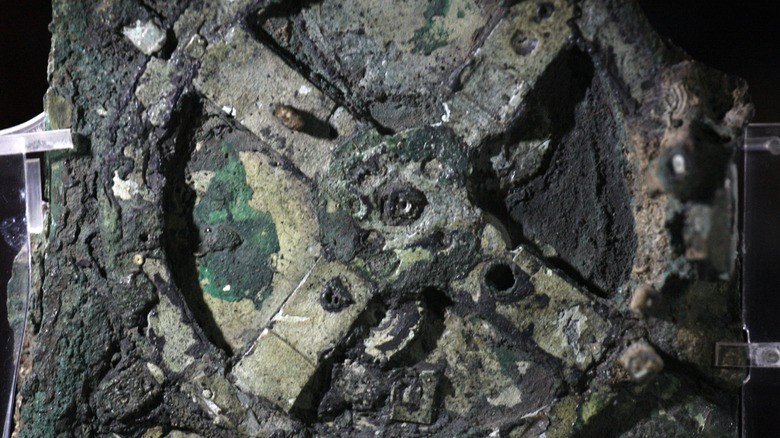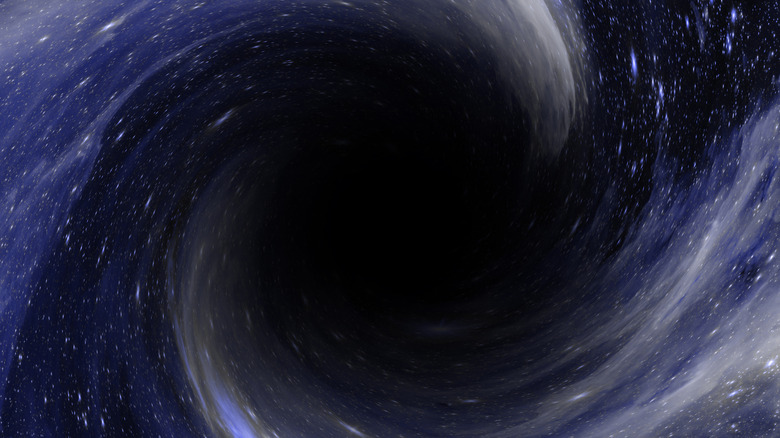Questions That Won't Be Answered In The Next 50 Years
Curiosity is hardly a trait exclusive to humans. For instance, certain species of rats and monkeys have been observed to display an interest in novel things in their immediate environment, to the point where they are even willing to exert effort to gain the "reward" of learning. There is no denying, though, that curiosity has propelled humanity's development far more than any other known species on the planet. Many areas of life, including medicine, communication, and transportation, have vastly improved in terms of efficiency and convenience. Indeed, we've come a long way from using electric fish to cure migraines and mistakenly believing dinosaur bones to be fossilized giant testicles, and so it may come as a surprise that some answers to life, the universe, and everything are unlikely to be solved by the mid-2070s.
Yes, there are still some important inquiries that even the world's greatest minds have yet to answer — conundrums that will likely remain so 50 years from now. Here are some of the most mind-boggling enigmas that have been worked on for quite some time already, and why we probably won't know the answers anytime soon.
How did the first living thing on Earth become alive?
Earth has been around for approximately 4.5 billion years, and evidence from the fossil record strongly suggests that the oldest life forms emerged 600 million years later. Unsurprisingly, among the longest-standing stumpers in human history is determining the exact circumstances in which life began on Earth. One theory, following an experiment exploring the possibility of life originating from a "primordial soup," highlights the planet's chemical makeup before the emergence of the first life forms. Another suggests that the building blocks of life may have been deposited on Earth by comets.
One of the earliest attempts to figure out the origin of life dates back to the 4th century B.C., long before the popularization of the scientific method (per Northern Arizona University). After observing that flies, worms, and other critters seemingly emerged from dirt and spoiled food, people believed that life could be spontaneously generated — that living organisms sprang to life from nonliving things. This was eventually debunked by 17th-century naturalists like Francesco Redi, whose experiment involving rotting meat proved that maggots and flies don't just pop up from nonliving things, and Maria Sibylla Merian, whose illustrations documented the stages of insect metamorphosis.
Scientists now know that Earthly life requires three ingredients: energy, essential elements (e.g., carbon, hydrogen, and oxygen), and water. Regardless, we still can't replicate how these combine to "create" life.
How and why does the human brain create consciousness?
At this precise moment, you are aware that you are reading this article. This is made possible by your consciousness, which also grants you the ability to feel emotions, form thoughts, experience pain, and react to stimuli around you on a level beyond what is necessary for your survival. But both the "how" and the "why" of human consciousness are questions that experts still can't answer.
According to Scientific American, researchers tend to fall into either of two camps: one that says Homo sapiens is unique due to our ability to have subjective experiences, and another that upholds that "consciousness" is nothing special, just a biological function that all creatures possess. In other words, if your dog runs off after you accidentally kick it, did your pet actually get hurt, or was it just a biologically ingrained self-preservation instinct that kicked into autopilot?
In a 2018 paper in Frontiers in Psychology, researchers theorize that three components of behavior in animals — namely, tool usage, the capacity to communicate, and performing actions for self-amusement — work in conjunction in humans differently, thus making consciousness possible. Meanwhile, scientists (via a 2023 study in Nature) used neuroimaging data to examine the brain's functional structure, with respect to three core dimensions of consciousness (wakefulness, awareness, and sensory integration). Ultimately, though, we still don't know the specifics of how and why the electric signals in our brains generate consciousness.
How (and why) does the universe exist?
The Big Bang theory is the most commonly accepted idea of the birth of everything as we know it: a single superhot point that somehow rapidly expanded over of billions of years, becoming the universe we observe today. But while this theory does provide a plausible, math-based explanation as to how the universe came to be, it doesn't really address why it exists — a question which philosophers have tackled as earnestly as scientists.
An article published in a 1999 edition of the journal Philosophy mentions three possible responses: the universe owes its existence to an omnipotent creator, the universe exists simply because it does, and — perhaps most mind-bending of all — the universe is responsible for its own existence via a closed time-loop of sorts. According to the writings of 17th-century philosopher Gottfried Wilhelm Leibniz, a "Real Being" (i.e., God) was responsible for the creation of the universe; in other words, there had to have always been something for the universe to come into existence. Other thinkers, however, approach the question by treating the universe's existence as a "brute fact," or something that does not require further explanation (per EarthSky).
There's also the "no-boundary proposal" developed by theoretical physicists Stephen Hawking and James Hartle in 1983 (via Physical Review). Based on this, the universe has neither a beginning nor an end, so looking for either is pointless. As Hawking himself put it (via Quanta Magazine): "It would be like asking what lies south of the South Pole."
Why do we need to sleep?
Sleep is one thing we cannot live without, in the literal sense. We spend about one-third of our lives snoozing (or at least trying to get some shut-eye), and that our overall well-being greatly depends on getting enough sleep. However, we're still in the dark about why it's a biological need, instead of just something pleasurable.
Over the years, researchers have developed a few theories to explain the need for sleep. Some experts say that sleep is useful for conserving energy: According to PloS One, getting eight hours of sleep daily can cut a person's energy expenditure by 35%, and the International Journal of Endocrinology states that humans use the least amount of energy when asleep. Another theory proposes that sleep serves as the mechanism for mental recovery, muscle repair, and cellular restoration. A study published in Sleep subjected rats to days of completely zero sleep. The animals showed signs of increased energy expenditure and deteriorating health — and all of them died after a month.
Lastly, the brain plasticity (information consolidation) theory suggests that the brain uses the hours you spend sleeping to organize and process the entire day's data, thereby affecting your cognitive functions (per The Journal of Neuroscience). However, despite these ongoing efforts to figure out why we need sleep as much as food and water, a definitive answer is still a long way off.
What is the cure for cancer?
In 2021, according to WebMD, cancer caused the deaths of more than 10 million people worldwide, cementing its reputation as one of the most lethal diseases known to man. Despite approximately two centuries' worth of brainpower and funds allocated toward cancer research, a cure for this condition has not yet been discovered — and it's highly unlikely that a one-size-fits-all cure for cancer will ever be found.
One of the main reasons why no cure for cancer exists is because "cancer" doesn't just pertain to a single illness. Per WebMD, there are over 200 varieties of cancer, affecting different parts of the body and manifesting in an assortment of ways. Moreover, even cancer cells in the same tumor can have different mutations (per Worldwide Cancer Research). Worse, it turns out that cancer cells are extremely adept at dodging the immune system, which is why some cancer cells can survive treatment and rear their ugly heads elsewhere in the body.
With that said, a cancer diagnosis isn't necessarily terminal. Numerous treatment options exist, and global survival rates have greatly improved over the last few decades. Moreover, experts say that focusing on cancer prevention will yield better results than scrambling for a cure (per Harvard Public Health). Ultimately, though, the only way a cancer patient can say they're "cured" is if the symptoms disappear and never resurface for the rest of the person's lifetime.
What is the total number of species living on Earth?
This might sound like the kind of question that a decent biologist should ace: "How many plant and animal species does our planet have?" But apparently, coming up with a definitive answer isn't as easy as you might think — and not just because there are too many to count.
Doing a manual survey of every single species on Earth would be a logistical nightmare. That's why experts turn to good old math for satisfactory estimates (per the National Wildlife Federation). The numbers vary depending on which formula you use, though: habitat-based comparisons place the number somewhere between 3 million and 5 million, body-size-to-population ratios suggest that terrestrial animals alone comprise 10 million of Earth's species, and calculations based on evolution-influenced patterns in nature (per Science) gives a figure somewhere in between: 8.7 million. One study, published in the Proceedings of the National Academy of Sciences, yielded an astounding number after looking at the DNA sequences of microbe species across the planet: almost 1 trillion, which basically says we've barely scratched the surface in terms of identifying all of them.
And then there's the matter of defining exactly what a "species" is. Shared physical traits alone don't hold up to scientific scrutiny, while basing this on the ability to breed excludes not only asexual organisms, but also conventionally separate species that have been observed to mate.
Why was the Antikythera mechanism so ahead of its time?
Imagine exploring an ancient shipwreck and stumbling upon a mysterious mechanism that looks way ahead of its time. That's exactly what divers experienced over a hundred years ago, when they were searching the remains of a Roman cargo ship near Antikythera, Greece. The dilapidated device, which looked like something straight out of a steampunk novel, became known as the Antikythera device. It raised a couple of questions: What was it for? How did ancient scientists assemble what many call the earliest known analog computer? Why was it so ahead of its time, and why haven't we found more mechanisms like it from the same era?
Over the years, researchers have been able to determine, with some level of confidence, what could have been the device's primary functions. After studying its 82 fragments, experts concluded that this geared mechanism, which featured parts made out of bronze, was likely used to map and track cosmic events and objects (particularly the planets, the sun, and the moon) in the night sky. Given its complexity, scientists speculate that it couldn't have been unique; that prototypes or even other similar devices are out there. But to this day, we still haven't found anything like it. As materials scientist Adam Wojcik told The Guardian, "If [the ancient Greeks] had the tech to make the Antikythera mechanism, why did they not extend this tech to devising other machines, such as clocks?"
Where did water come from?
Despite the fact that more than two-thirds of Earth's surface is water, we still can't say for certain exactly why there's so much water on our planet. Surprisingly, figuring out how water became so abundant on Earth takes more elements into consideration than just hydrogen and oxygen. In fact, experts say that to be able to adequately trace the origins of Earth's water, any acceptable theory should not only factor in how elements like helium, carbon, and nitrogen appeared on the planet, but also jibe with contemporary, evidence-based ideas about how the Solar System came to be.
One theory proposes that water arrived on Earth via cosmic snail mail. "Water-rich" objects such as meteorites and asteroids may have crashed on our planet long ago, depositing the necessary components on Earth's surface. While this is presently the most popular and accepted explanation, some question its accuracy. In a 2023 study in Nature, researchers detected abysmally low amounts of water in the cosmic objects within the vicinity of the early Solar System. In other words, while some water may have come from them, it's unlikely that they were the main source.
Meanwhile, another 2023 paper in Nature suggests that most of our water may have resulted from interactions between atmospheric hydrogen and prehistoric "magma oceans." Then again, the explanation could be a bit of both, but nobody is certain to what degree.
Where were the Hanging Gardens of Babylon located - and did they even really exist?
The most well-known iteration of the Seven Wonders of the Ancient World is based on a list compiled by Philo of Byzantium, a Greek engineer, about 225 B.C. Among these seven attractions, only the Pyramid of Giza has survived the passage of time. But there's one other wonder on the list that is noteworthy among its peers, for an entirely different reason: the Hanging Gardens of Babylon, which is said to have been a project of Babylonian king Nebuchadnezzar II.
The Hanging Gardens of Babylon is the only entry on the list of wonders whose location is a mystery. So mysterious, in fact, that no verifiable archaeological records exist to pinpoint it — a fact that has raised doubts about whether it even existed at all. Save for a few "quasi-credible" descriptions penned by Roman and Greek historians, there is a noticeable dearth of historical evidence about what the Hanging Gardens actually looked like or where they were.
Some modern-day historians have gone so far as to claim that the gardens were simply an imagined story. Others argue that this conundrum may have simply been a case of mistaken identity: that Philo was actually referring to the Hanging Gardens of Nineveh (which was erroneously called "Babylon" by ancient scholars). Therefore, it is unlikely that we'll ever know, as any remaining proof of the Hanging Gardens' existence is probably hidden underwater.
Why do we remember (and forget) things?
Memories are among the most precious things a human can possess, yet the mechanisms that make storing memories in the brain are still shrouded in mystery. For instance, no one can say for sure exactly how the mind manages to transform the information it receives into memories that it retains. Researchers take a more compartmentalized approach to studying memory, looking at various aspects and piecing all the data together like a puzzle.
From what experts currently know, the mind is particularly adept at remembering significant life events (e.g., weddings, graduations) as well as words that can be pictured or have a physical, visual counterpart (as opposed to abstract concepts). Remembering things is just half of the equation, though. As it turns out, forgetting things isn't so much a flaw as it is a feature (per Time).
Can you imagine if your brain involuntarily retained every single piece of information it would come across in a day? It wouldn't take long before your mind gets filled to the brim with data that you don't really need, leaving little to no room for new information you need to retain. Some experts even suggest that giving your brain time for daily mental housekeeping may actually be one of the main purposes of sleep. Still, further research is needed for scientists to better understand the relationship between memories and neural activity, memory sharpness, and even the areas of the brain that store memories.
Up to what age can a human being live?
According to BBC Science Focus, the current verifiable record for the longest amount of time a person could live is 122 years and 164 days (approximately 122.45 years). While it's not so common, it also isn't so strange to hear about people living past a century. But can we really identify the limit of human life expectancy?
Experts' opinions vary when it comes to this topic. Some say that the average human can expect to live up to 80 or 90 years old, thanks to modern-day medical innovations; others estimate that our genomes are hardwired to keep us alive until the age of 115 (per Scientific American). Interestingly, a professor of molecular biogerontology at England's University of Birmingham, João Pedro de Magalhães, looked at the genomes of other animals famous for their relatively longevity (such as naked mole rats and bowhead whales) and came to the conclusion that it's possible for humans to live for literal millennia, albeit with genetic modification targeting the cellular functions that regulate aging.
Meanwhile, 2023 research in PLoS One examined mortality records from 19 "high-income" nations and concluded that the maximum lifespan of the average person will only steadily increase as the decades roll by, due in part to new life-saving technologies. Basically, it's tough to crack this one, because the answer will always be the age of the oldest person to die, until someone else surpasses them.
How does gravity work?
For something so ubiquitous and essential to our existence, it's funny how we're still not experts on how gravity works. We can describe how gravity affects the real world based on the established laws of physics — the attraction between two objects, with respect to their masses — but there are still many mysterious aspects of gravity that have left scientists stumped for the longest time.
For example, despite experiments throughout the years to demonstrate the connection between gravity and quantum mechanics, researchers still haven't observed any measurable differences that could effectively unify these two theories. It continues to be a holy grail for physicists, though, since such a theory could fully explain the fundamentals of the universe. It also doesn't help that the foundations of our current understanding of gravity aren't exactly bulletproof.
The pioneering work of Sir Isaac Newton, for instance, couldn't explain black holes and other gravitational phenomena; nearly three centuries later, Albert Einstein's general theory of relativity helped plug some of those holes. However, a recently published study in The Astrophysical Journal shows that the observed orbital accelerations of widely separated binary stars don't line up with Newton-Einstein predictions. Still, researchers haven't stopped trying to understand the secrets of gravity and come up with a "theory of everything." This proves that while studying gravity can sometimes be a drag, it can also really pull you in.
Dark matter and dark energy: What are they, exactly?
You may be familiar with the admittedly spooky-sounding terms "dark matter" and "dark energy." If it helps, you can think of them as dark not in the evil, malevolent sense, but in the "we literally can't see them" sense. Which, in a way, is still creepy, considering how approximately 95% of everything is made up of them, with the observable universe making up a measly 5%, according to NASA. To be more specific, more than two-thirds of everything is dark energy, while dark matter comprises a little over a quarter of the universe (per the Harvard & Smithsonian Center for Astrophysics).
The problem with trying to study dark matter and dark energy is that it's much easier to pinpoint what they aren't than what they are. For starters, dark matter isn't normal or visible matter; neither is it antimatter, since it doesn't produce the same radiation hallmarks we observe during matter-antimatter annihilation (via Space.com). Our understanding of how light works also disqualifies large black holes from being dark matter.
However, the apparent effects that dark matter has on galaxies and galaxy clusters have made researchers confident that there definitely is such a thing as "dark matter." On the other hand, dark energy is both mysterious in terms of its composition and impossible to directly measure. Of course, that hasn't stopped scientists from using high-powered telescopes in their attempts to find and study it.
What happens inside a black hole?
A fixture in science fiction and popular culture, black holes are typically depicted as either interdimensional gateways or all-consuming outer-space Sarlaccs. But what would really happen if you somehow had the misfortune of being pulled into one? According to Space.com, both interpretations are possible.
If it's the former, then the answer follows the wormhole theory developed by physicists Albert Einstein and Nathan Rosen in 1935, based on the "white hole" idea by another physicist, Ludwig Flamm, years earlier (per Space.com). Connected by so-called "Einstein-Rosen bridges," black holes and white holes could theoretically serve as cosmic shortcuts for interstellar travel. Sadly, the other possibility seems more likely: that entering a stellar-mass black hole, or a black hole that was produced by a star's gravitational "death," would cause your entire body to spaghettify, which is precisely as horrible as it sounds. A less violent (but no less disturbing) outcome would be if you somehow found yourself inside a supermassive black hole: you'd be able to see out, but you'd be impossible to see and rescue from outside the event horizon.
Ultimately, until someone is actually able to conduct an appropriate experiment (and survive to tell the results), any answer to the question of what happens inside a black hole would be based purely on educated guesses. Or, as Professor Richard Massey of Durham University's Institute for Computational Cosmology, succinctly puts it (via Space.com), "Who knows?"
What happens to you after you die?
Cleveland Clinic experts paint a pretty clear picture of what would happen to your body upon death, which includes a steady drop in your body temperature, discoloration of the skin, and your body alternating between "stiff" and "relaxed." But while we can describe the observable changes that happen to a deceased body, the non-physical experience of being dead is an entirely different story.
A study published in Resuscitation involved more than 2,000 cardiac arrest patients from the United States, the United Kingdom, and Austria. Over the course of four years, the researchers talked to the survivors who agreed to be interviewed (140 out of 330, per New Republic). 39% of their interviewees reportedly had some recollection of experiences and details during the period in which they were considered clinically dead. In an interview with Science Daily, lead author Dr. Sam Parnia explained that this was significant because brain function is said to cease within half a minute of the heart stopping; in other words, the results suggest that the idea of awareness after death merits further study.
Meanwhile, as recounted by the Independent, users in a Reddit thread who "have been clinically dead and then revived" shared unverifiable (albeit interesting) answers. Some compared their experiences to dreamless sleep; others recalled seeing their own bodies or being in absolute darkness.
Who was Jack the Ripper?
Few criminals are as well-known across the world as the infamous serial killer Jack the Ripper, which is ironic considering that we don't know his real name. Committing a slew of gruesome killings in the Whitechapel district near the turn of the 20th century, this mysterious London-based murderer left both the authorities and the general public baffled and horrified. Centuries later, his true identity remains a mystery.
A combination of scant evidence and antisemitism made it impossible for the police to unmask Jack the Ripper. At the time, all that London detectives had to work with were eyewitness accounts with questionable credibility, as well as a bloodied apron scrap and a shawl found near one of Jack the Ripper's five confirmed victims (Catherine Eddowes). Making matters worse, some citizens held the racist belief that Jack the Ripper was an immigrant, which led to a number of Jewish men being identified as potential suspects.
While Jack the Ripper's identity remains unsolved, it's not for lack of trying. Over the years, self-proclaimed Ripperologists have combed through every confirmed and suspected murder in an attempt to crack the case. In 2019, mitochondrial DNA analysis was performed on the shawl, but experts were quick to note that such testing could only exclude suspects, not pinpoint them (per Science). Thus, despite the tremendous leaps in forensic science, it is perhaps unlikely that we'll ever know who the Ripper really was.
Where is the grave of Alexander the Great?
The Macedonian ruler Alexander the Great, who was active during the fourth century B.C., is one of the most famous and successful military leaders in history, which makes it surprising that the final resting place of such an important historical figure remains unknown to this day.
Historical records indicate that the warrior king was initially laid to rest in Memphis, Egypt, by his friend and successor, Ptolemy I. Some years later, the king's body was reportedly moved to a different Egyptian city, Alexandria. Based on this, historians suspect that Alexander the Great's body may have been taken to the city's eastern part and placed in an unmarked tomb made of alabaster. Another potential location was a sarcophagus built for a pharaoh, Nectanebo II, who was never able to use it.
Unfortunately, at this point, we will probably never find out where Alexander the Great was actually buried. In an interview with LiveScience, Egyptologist and Robert Anderson Research Charitable Trust director Chris Naunton said that the modernization of the city, countless natural and artificial hazards, and a distinct lack of evidence regarding the tomb's appearance, all but guarantee that the tomb has been lost to time.
Who gave Earth its name?
Among all of the Solar System's planets (and former planets, for all you Pluto fans out there), Earth is unique, in more ways than one. Aside from being the sole planet confirmed to currently sustain life, it is also the only one that wasn't named after a god in Roman or Greek mythology.
Since the dawn of written history, our planet has gone by many names. According to Live Science, among Earth's alternative names was "Orbis," a name that Greek scholars coined referencing their knowledge that the planet isn't flat, and "Terra," a Latin word that literally means "land." Another moniker was "mundus," which was of Roman origin (with its Spanish and French derivatives, "el mundo" and "le monde," respectively). Meanwhile, the name "Earth" has Anglo-Saxon roots ("Ertha," which roughly translates to "the ground"), which in turn gave rise to other European counterparts (such as the Dutch "Aarde" and the German "Erde").
It's hard to say why the name "Earth" stuck, though. Experts assume that it just did, particularly since there appears to be no official declaration or law that made it so. This is also why the identity of whoever decided to name Earth "Earth" in the first place will perhaps never be discovered, unless we somehow ... unearth such a document.
Will everything eventually end? And if so, when?
Religious texts have extensively tackled the end of everything, taking a more prophetic, almost cinematic approach to describing the end times. Scientists have also come up with at least three very different scenarios; predictably, none of them look particularly appealing, and all of them are on the table until physicists come up with a theory of everything.
First on the list is the Big Crunch: According to its supporters, the continuous expansion of the universe means that eventually, there would be enough matter within it to not only stop its growth but also pull itself back in. To crudely illustrate this, imagine stretching a rubber band to its limits, and then letting go of both ends to allow it to snap back into its original shape.
The second theory, the Big Freeze, imagines what the universe will be like over the course of trillions of years. Initially, the distance between galaxies will become so great that they will be impossible to see, and no more stars will form. By the time the last supermassive black holes evaporate, all of the energy across the cosmos will be uniformly distributed, plunging the entire universe into cold darkness. Finally, proponents of the Big Rip believe that the universe will keep expanding until dark energy surpasses gravity's power. As a result, everything — stars, planets, even black holes — will be torn apart. By the end of this universe-wide destruction, all that will remain are "single, disconnected particles."



















